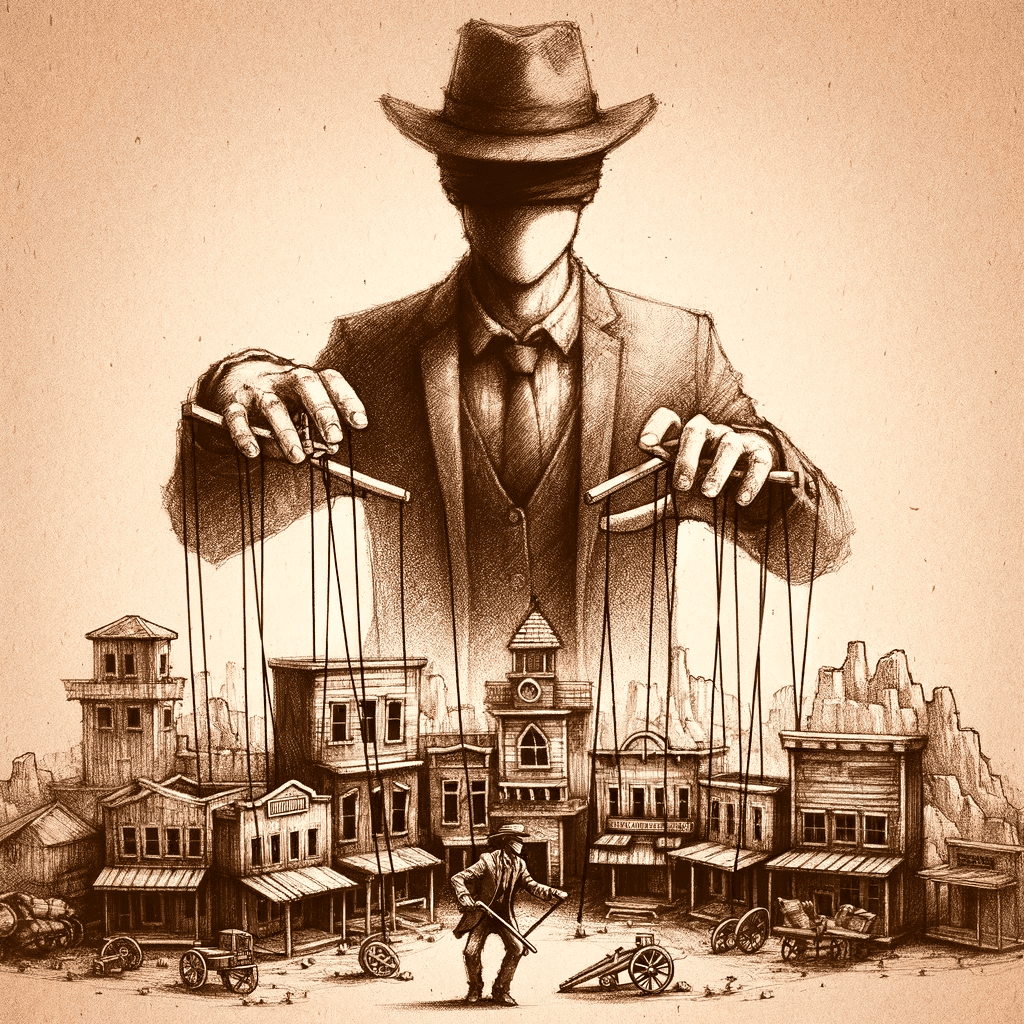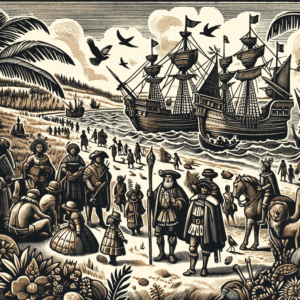 The storm bore down on Demomire like an ancient curse, the sky a brooding tapestry of churning grays and blacks. Thomas Dawson stood at the threshold of his homestead, his gaze fixed on the violent tempest that threatened to sweep away the last vestiges of his toil. The land, stubborn and barren, had resisted every effort to yield a decent crop, and now the fury of the heavens would claim what little remained.
The storm bore down on Demomire like an ancient curse, the sky a brooding tapestry of churning grays and blacks. Thomas Dawson stood at the threshold of his homestead, his gaze fixed on the violent tempest that threatened to sweep away the last vestiges of his toil. The land, stubborn and barren, had resisted every effort to yield a decent crop, and now the fury of the heavens would claim what little remained.
Inside, the simple abode rattled and groaned under the tempest’s wrath. Dust motes danced in shafts of light that fought their way through cracks in the wooden shutters. The once vibrant glow of the hearth had dwindled to a feeble flicker, mirroring the dying hope in Thomas’s heart.
Helen Dawson emerged from the shadows, her silhouette framed by the dim light. “Thomas,” she called out, her voice laced with an edge sharper than the wind’s howl outside.
He turned from the door, his deep brown eyes meeting hers. “It’s gone, Helen,” he said flatly. “All of it.”
“We could have asked for help earlier,” she countered, her hands wringing the fabric of her apron—a nervous habit that had grown more frequent with their deepening despair.
Thomas’s jaw tightened. “And look weak before our neighbors? I won’t have them pity us.”
“Pride won’t feed Elijah and Annie,” Helen shot back, her hazel eyes flashing with a mix of frustration and fear.
The farmer’s muscular frame seemed to bear an invisible weight as he moved closer to his wife. His voice dropped to a menacing whisper. “I will not let our children starve.”
Helen recoiled slightly but held her ground. “Then stop this foolishness! Swallow your pride before it devours us all.”
The words hung between them like specters, chilling and unyielding. A sharp crack split the air as lightning cleaved the sky outside, throwing their shadows against the walls in a grotesque dance.
“You think I don’t know?” Thomas’s voice broke through the thunderous din. “You think I don’t lie awake every night wrestling with my demons?”
Her expression softened at his torment. “I know you do,” she admitted quietly.
“But we need you here, with us, not lost in battles long since fought.” Her plea reached out to him through the darkness that filled their home and hearts.
Thomas turned away, a solitary figure grappling with his own storm—the war within. The cacophony outside grew louder, a symphony of nature’s indifference to human suffering.
Helen moved toward him, her steps tentative yet determined. The tempest raged on unabated as they stood together in silent resolve—a couple united against an uncaring world.
Outside, a figure materialized through the curtain of rain, his duster coat billowing like the wings of some dark angel.
“Get to the bedroom,” Thomas commanded in a low growl, his eyes never leaving the shadowy form that advanced with an unsettling determination. Helen didn’t argue; with a tight grip on each child’s hand, she ushered them toward the safety of their small bedroom.
The drifter’s approach was methodical, each step a deliberate imprint on the muddy earth. His wide-brimmed hat obscured his face, but from beneath its rim, those piercing grey eyes fixed on the homestead as if he could see through its walls and into its very soul.
Thomas’s hand instinctively went to the rifle that rested against the wall—its wooden stock worn from years of use. His fingers traced the grain as memories of war surged through him—echoes of gunfire and cries that no amount of time could silence.
The children clung to Helen, their small bodies trembling not from cold but from fear—a fear that seemed to emanate from their father’s rigid back. “Stay quiet,” Helen whispered, her voice a soothing balm against their racing hearts. She knelt beside them in the dimly lit room, her hands steady despite the storm within and without.
The door creaked ominously as the figure raised a gloved hand and knocked—a slow, rhythmic sound that cut through the tempest’s wail. Thomas moved with caution, every muscle coiled and ready. He reached for the door latch but hesitated—an eternity passing in seconds—as he grappled with the unknown intentions of this solitary visitor.
Finally, steeling himself against his own apprehension, he flung open the door. The drifter stood before him—a silhouette framed by lightning. “Need shelter,” came a voice like gravel and smoke—words few but heavy with fatigue.
Thomas sized up the stranger in silence; war had taught him well how to read men’s intentions. The farmer stepped aside wordlessly, allowing nature’s refugee entry into their humble abode. As the man crossed the threshold, he removed his hat—a simple gesture that somehow lightened the oppressive atmosphere.
With each step he took into their home, Helen felt an inexplicable calm wash over her—a calm that had no right to exist in such circumstances. Thomas watched closely as The Drifter settled near the hearth. No words were exchanged—none needed—as each man assessed the other in silence. A tacit understanding passed between them: two souls haunted by their pasts and bound by an unspoken code of survival.
Thomas came to sit in his chair opposite the drifter, the room, warmed only by the meager flames that licked at the logs in the hearth, seemed to shrink with the presence of both men seated near the fire. Thomas and the man sat in a silence that was both companionable and fraught with the unspoken. The storm’s relentless fury against the homestead provided a discordant soundtrack to their vigil.
“I don’t mean to bring trouble upon your house,” the man began, his voice a low rumble that seemed to resonate with the very walls. “Just seeking shelter from the storm, and if it’s not too much to ask, a bite to eat.”
Thomas studied the man before him—the tangled dark hair, the scars that mapped stories on his face—and saw not an intruder but a fellow wanderer of life’s treacherous paths. “Trouble is no stranger here,” Thomas replied with a hint of a grim smile. “As for food, we ain’t got much, but what we have, we’ll share.”
Helen watched from a distance, her eyes reflecting the dance of firelight and shadows. The kindness in her husband’s voice did not escape her; it was a testament to his true nature—a nature that had been weathered but not broken by hardship.
She rose silently and moved toward their meager larder, retrieving what remained of their provisions: a loaf of bread grown stale with time, some salted pork that had seen better days, and a jar of preserves—Elijah’s favorite. She placed them on the table with care, each item a sacrifice on the altar of hospitality.
The man observed her movements with an intensity that missed nothing. His eyes softened as he took in the sight of Elijah and Annie peeking from behind their mother—a silent tableau of familial bonds and unspoken love.
“Ma’am,” he addressed Helen with an air of respect that belied his rough exterior. “I’m obliged for your kindness. The road’s been long and lonesome.”
As they gathered around the humble offering, there was an unaccustomed warmth that seemed to seep into their bones—an intangible gift bestowed by this stranger whose very presence defied explanation.
They ate in silence mostly, save for the sound of rain pelting the roof and windows—a staccato rhythm that underscored their fragile sanctuary from nature’s wrath.
“Would’ve kept going if it weren’t for this damned storm,” the drifter continued between bites. His words were casual but carried weight;
Thomas nodded as he tore a piece of bread with fingers still calloused from labor and war. “Storms have a way of changing plans,” he said quietly. “Sometimes they bring us to places we never expected—or back to places we thought we’d left behind.”
The children, Elijah and Annie, sat on the rough-hewn floorboards, their legs crossed beneath them. Their initial shyness around the drifter dissipated as they studied his face, finding something unexpectedly reassuring in its rugged landscape. The man’s eyes held their attention, a softness there that invited trust.
Elijah spoke first, his voice a hesitant murmur that grew in confidence with each word. “We used to have a dog, sir. A good ol’ hound named Chester. He’d follow me everywhere, even to the creek when I wasn’t supposed to go.” The boy’s eyes sparkled with the memory, a smile tugging at his lips.
Annie chimed in, her words tumbling out in the earnestness of youth. “And we have a garden! Mama and I plant flowers every spring. They don’t grow very well here, but we try every year!” Her hands animated her story as she described each flower with an artist’s detail.
The drifter listened, his expression one of genuine interest. He asked questions that prompted more stories—tales of makeshift forts in the woods, of summer nights catching fireflies, of winter days when frost turned the world to glass. With each shared memory, the room seemed to grow warmer, the storm outside receding into a distant threat.
Helen and Thomas exchanged glances across the table—a silent acknowledgment of this unexpected grace. The presence of this stranger had brought about a small miracle: laughter and chatter filled their home once more. The couple’s gratitude was as palpable as the heat from the hearth. The stranger had become an unwitting catalyst for this brief reprieve from worry and hardship.
As they continued to talk into the evening, stories gave way to songs—soft melodies hummed by Helen that filled the spaces between thunderclaps. The man joined in with a surprisingly gentle voice that harmonized with hers.
Outside, the storm raged on with relentless fury; inside, however, there was warmth and a semblance of peace—a fragile moment suspended in time where nothing existed but tales of hounds and gardens.
The hours waned as the night deepened, the storm outside unabated, as if the heavens themselves were locked in an eternal battle. Inside the homestead, the fire’s glow was the only defense against the encroaching darkness, casting a protective circle of light around Thomas and the stranger.
Helen stood and stretched, her bones aching from the tension that had seeped into them. “I’ll take the children to bed,” she announced with a yawn that she didn’t bother to hide. Elijah and Annie protested sleepily, but their mother’s firm hand on their shoulders guided them away from the warmth of the hearth and into the cool embrace of their shared bedroom.
As Helen tucked them in, her hands moved with practiced care, smoothing blankets and planting soft kisses on foreheads. She lingered at the doorway for a moment, watching her children succumb to sleep’s gentle pull. Their peaceful faces were a balm to her frayed nerves, and she allowed herself a small smile before quietly closing the door behind her.
With his family retired for the night, Thomas returned to his guest with a sense of camaraderie that surprised him. He retrieved a dusty bottle from a high shelf—the last of his whiskey, reserved for times when solace was needed most. The two men shared swigs straight from the bottle, the fiery liquid scorching their throats and igniting a warmth that fought back against the chill.
“Your company’s been… unexpected,” Thomas admitted, his words loosened by alcohol and gratitude. “I can’t remember when we last had such an evening.”
The drifter nodded, his own voice softened by whiskey and shadows. “The road’s lonely. A night like this reminds you there’s still good in this world.”
They sat in companionable silence for a time, each lost in their own thoughts until The Drifter spoke again. “I can see life’s dealt you a rough hand,” he said, his eyes reflecting the flickering flames. “The land here… it’s unforgiving.”
Thomas let out a humorless chuckle. “That it is,” he agreed with a sigh.
The drifter reached into his coat and pulled out an object wrapped in cloth. Unfolding it carefully on his knee, he revealed a grotesque golden statue—a figure twisted in agony or ecstasy; it was hard to tell which.
“I found this in the woods,” The Drifter explained, turning it over in his hands so it caught the light in eerie ways. “Thought I might sell it—try to mend my fortunes, but I reckon,” The Drifter continued with an unreadable expression, “you need it more than I do.”
Thomas hesitated before reaching out to take it; his fingers brushed against The Drifter’s—rough hands meeting in an exchange laden with unspoken implications.
“I don’t know what to say,” Thomas murmured.
“Don’t say anything,” The Drifter replied with finality. “Just take it as a sign that fortune’s winds might change for you yet.”
Thomas nodded slowly; words failed him as he considered this unexpected boon—the grotesque beauty of the statue ensnaring him with possibilities that flickered like shadows at the edge of thought.
They sat together as time slipped away unnoticed—two souls cast adrift on life’s turbulent seas who’d found temporary harbor in each other’s presence. The whiskey bottle eventually ran dry, but its absence did nothing to diminish the warmth that had settled between them—a warmth that defied both storm and darkness outside their fragile bastion of light.
Eventually, The Mysterious Drifter rose from his seat by the fire—a specter preparing to fade back into obscurity—but not before giving Thomas Dawson one final nod of acknowledgment—a gesture that carried more weight than any spoken farewell.
As Thomas watched him retreat to whatever corner he’d chosen for rest, he turned the golden statue over in his hands once more—a macabre talisman whose true power lay hidden beneath its gleaming surface—and wondered what dawn would bring with such an omen cradled within their walls.
As the first light of dawn crept across the room, chasing away the remnants of night’s shadows. Thomas Dawson lay still in bed, a sliver of sun warming his weathered face. He could hear the distant sound of Annie’s voice, a strange melody that seemed to ride the morning breeze. Her song was unlike any he had heard before—a lilting tune that was both haunting and beautiful.
Thomas sat up, the memories of the previous evening returning to him in fragments. The Stranger’s visit, the stories shared by firelight, and the unsettling gift of the golden statue—it all felt like a strange dream now. But as he glanced at the spot where he had carefully placed the grotesque figure, it was gone.
Perplexed and instantly vigilant, Thomas sprang from his bed and swiftly donned his clothes. The enigmatic wanderer had vanished. Thomas made his way to the window, peering out into a world transformed. The storm that had raged with such fury was now a mere memory, its violence replaced by an impossible serenity.
Outside, their farm flourished as if blessed by an unseen hand. Rows of corn stood tall and proud, their leaves a vibrant green that shimmered with dew. Vegetables that had struggled to survive now burst from the earth in a riot of color and abundance. It was as if the storm had never happened.
Annie danced among the plants, her movements carefree and full of joy. In her small hands, she held the golden statue, cradling it like a precious friend. She sang to it sweetly, her voice weaving between reality and enchantment.
Thomas stepped outside, disbelief etching his features as Helen joined him on the porch. Their eyes took in the sight before them—their land, once stubborn and unyielding, now generous beyond their wildest dreams.
“What happened here?” Helen whispered, her gaze fixed on Annie and her peculiar dance.
Annie stopped twirling as she noticed her family’s stunned expressions. A smile of pure innocence spread across her face as she approached them, holding out the statue for them to see.
“My gold friends made everything grow,” she declared with childlike certainty. “They heard my song and came to help!”
Thomas reached out tentatively to take the statue from Annie’s grasp, but she would not release it.
Helen placed a hand over her mouth, tears welling in her eyes as laughter bubbled up from within her—a sound that mingled relief with wonder. Thomas looked at his wife, then back at their daughter—their miracle worker—and allowed himself to believe.
“Thank you,” he murmured to Annie or perhaps to forces unseen as he stared at the small statue.
The family stood together in awe—united by this extraordinary moment that defied explanation.





